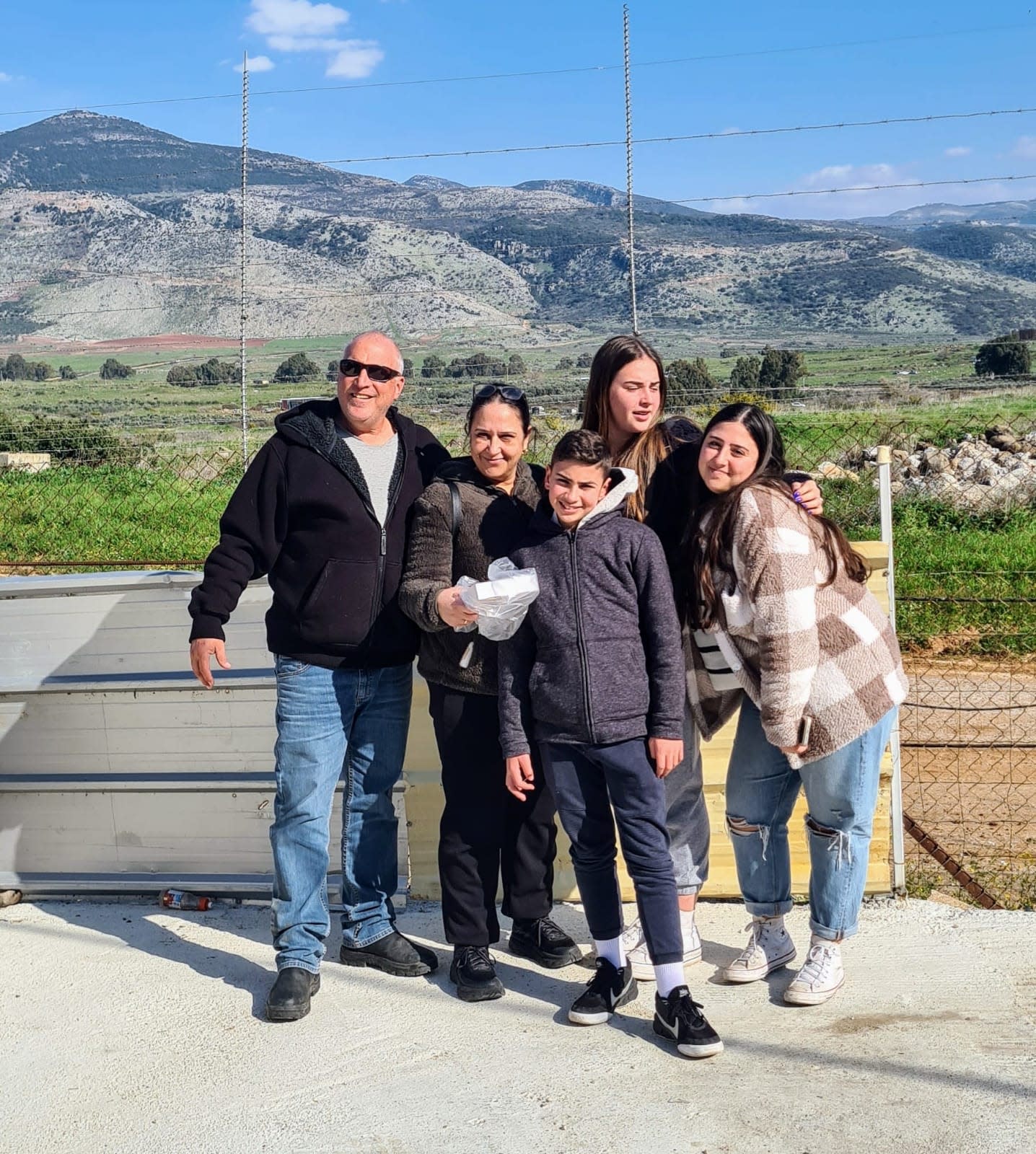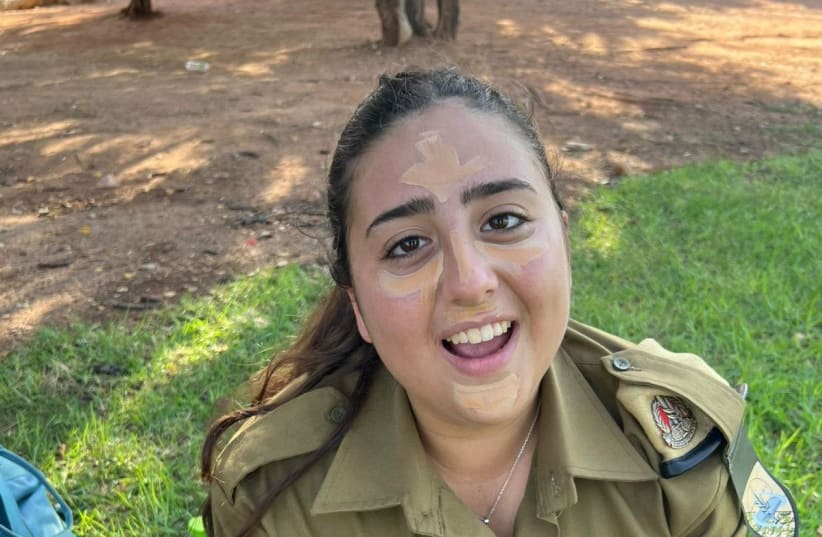The Swords of Iron war brought IDF lookouts to the front, talented young women who had their whole lives ahead of them before they were cut short on Black Saturday; women who warned of the dangers, but no one listened to them. One such young woman was Roni Eshel. We talked to Eyal Eshel, Roni's father.
What would you like people to know about Roni?
Roni smiled at everyone. She was all heart, giving until the last minutes of her life at the age of 19 and a half. I want people to know the whole story that happened there, the cruelest of stories.
When did you realize something bad was happening?
The story began months ago when all the girls were claiming, reporting, typing, and shouting that there were problems with the security fence, that there were whole sections that didn't work, that there were riots near the fence on Fridays and Saturdays and holiday eves, that the cameras didn't work. They said that no one addressed their claims. They were told that this would pass, but it would go on and on.
They went through briefings in which they were instructed that if there was a raid and an infiltration into the base, that they should go into the dining room, where they wanted them to gather. But no one thought to guide them really where to go, no one told them. From the beginning of their enlistment, they were soldiers who belonged to no one. At the end of the day, these troops had to be there for each other and for themselves. Their commanders were not at the base, which was a temporary base for many. Combat soldiers would gather there for three months, after which they moved on. They were based there to execute operations. But no one was interested in the female soldiers there. The girls were frustrated knowing that eventually something would happen, but that no one would answer their requests, protect them, and tell them where to go.
When did you see Roni last?
Roni was with us on Hol Hamoed Sukkot. She should have had a regular vacation day off, but they included that in the days when she was supposed to be at home anyway. She would serve for nine straight days on base, then come home for five. None of the girls had the right to say anything. The last time we saw each other was on the Wednesday before October 7. Roni stood at the entrance to the house and said, 'Abba, the situation is really heating up there. They know everything about us. They read us, they study us.' I put my hand on her shoulder and said, 'Roni, what happened to you? Everything will be fine; we have a good and strong army.' She returned to the base in the morning, and we never saw her again.
What do you know about what she went through?
On the way to the base neer Kibbutz Nahal Oz, Roni met the three new female soldiers who were to be stationed at the base. One arrived on Thursday, a day when another force of dozens of soldiers arrived as part of the consolidation and backup of the Nahal Oz base. On Friday, another force arrived, and in the afternoon we know from testimonies and information we gathered ourselves that at the noon meal on Friday, there were over 100 soldiers who sat, ate, and continued on their way. Some of them went back to Judea and Samaria, some of them went to secure other places. Because of Sukkot and Simchat Torah, the base was completely empty of soldiers. We know that on Saturday morning, there were only about 60 soldiers there. On Friday afternoon, the mother of one of the soldiers brought a lot of good food because her son was supposed to be discharged four days after October 7. This became their farewell dinner, the soldiers' last meal. They ate dinner, laughed, and sang and were full of smiles and hugs and kisses. All that we have left of that are the photos and videos.


That night, there was an indication that something bad was happening across the border in one of the more difficult neighborhoods of the Gaza Strip. With the information received, the senior part of the security establishment was put on alert. They were on a phone call together, without the commander of the Air Force, who did not participate in the important conversation. As a result of the data they were presented with, they arranged to talk in the morning, which turned out to be too late for the entire State of Israel.
Our Roni got up a little before four in the morning on Saturday and started her shift.
A lookout's shift is four hours, sitting in front of a screen in the most concentrated way possible. A difficult shift is with weather conditions that can change. It is heavy work at what's called ‘zero dark thirty.’ Roni was aware of the developments and events that were happening across the border. Later, she contacted a lookout at the Kissufim operations room.
The hours passed, and it became early morning. At 6:23, missiles and alarms began as part of a diversion by Hamas, ISIS, and Islamic Jihad and the many civilians who were responsible for the massacre, murder, rape, kidnappings, mutilation of bodies, and looting. Not only terrorists entered Israel early in the morning. Citizens of Gaza were full partners in this holocaust, citizens who today seek humanitarian aid from Israel.
During that time, we had no contact with Roni. At 9:27, Roni texted my wife, Sharon, and wrote that she was fine and was in the operations room and not to worry. Sharon wrote to her, 'Hi dear, call me back. I'm worried. I'm at home.' Roni wrote back, 'I'm fine, don't worry. I love you.' That was Roni's last message and our last communication with her.
Hours went by without any information from the IDF and the security establishment. Roni entered the category of missing persons because no one knew where she was. For 34 days, no one knew what was happening to her, until we received information that she was declared dead after a DNA match. We received Roni's personal items, which were scattered around the base. We recently received her ID card and license that were found in a house in the Gaza Strip, apparently part of the looting, which is still under investigation by the IDF. All we remember from Roni is her smile, her giving, and the fact that she was an amazing soldier.
None of them made it out alive?
One female soldier survived because she escaped from the operations room. They were 16 female lookouts, who disappeared from the world and were burned alive. We recently found out that the soldier who survived told one of the mothers that our Roni was a hero. When it all started, Roni asked one of the officers, who also survived, to immediately go to the shelter where other female soldiers were and to do everything to save them. We know that some of them were kidnapped, some were saved, some lost their lives in the shelter and some in the operations room. The sad story of Nahal Oz is our story about Roni.
Did Roni always want to be a lookout?
She didn't enlist to be a combat soldier. She loved the girls, her friends. They were there for each other all the time. They were like a family, with a lot of giving, love, and care. Roni was not supposed to be on that particular shift. She asked to change so she could be with these girls with whom she had an amazing connection. We're left with the thought that if she hadn't changed shifts, Roni would be with us today, but others would have lost their lives. Roni really liked the role. She controlled the systems, and as a veteran she trained the new girls. She was wise and clever and very technological. She loved the technological systems.
We are left with videos, memories, and the thought that Roni and her friends fell in battle due to negligence and carelessness. If Roni had fallen in battle in Khan Yunis's refugee camp, it would have been different.
This article is taken from The Jerusalem Post, 'Women - Heroines of Swords of Iron' Magazine 2024. To read the entire magazine, click here.
